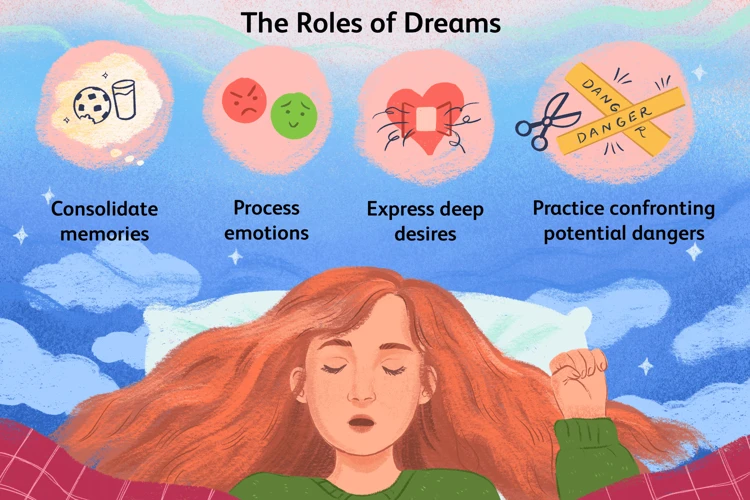Our dreams often hold hidden meanings and can offer insight into our deepest fears and desires. One recurring dream that many people experience is the fear of being late. This dream can evoke feelings of anxiety, stress, and even panic. But what is the connection between these dreams and the fear of failure? In this article, we will delve into the significance of dreams, explore the fear of failure, examine the correlation between being late dreams and the fear of failure, and discuss psychological perspectives and strategies for overcoming this fear. So, if you’ve ever found yourself waking up in a cold sweat after dreaming about being late, read on to uncover the intriguing link between these dreams and the fear of failure.
The Significance of Dreams

Dreams have long been a subject of fascination and intrigue, as they hold a significant place in our subconscious mind. They serve as a representation of our deepest desires, fears, and emotions. The notion that dreams can provide insights into our psychology and life experiences has captivated researchers and psychologists for centuries. Psychoanalytic pioneers like Sigmund Freud believed that dreams are a window into the unconscious mind and can reveal repressed thoughts and unresolved conflicts. Dreams can serve as a form of emotional processing, allowing us to explore and make sense of our emotions in a safe and symbolic manner. When it comes to the specific topic of being late dreams, research suggests that they carry their own unique significance. These dreams often arise from a sense of urgency, fear of missing out, or the anxiety associated with not meeting deadlines. The emotions experienced in these dreams, such as stress and panic, can provide valuable insight into our relationship with time management and the fear of failure. By analyzing the symbolism behind being late dreams, we can better understand the underlying emotions and fears that drive them. Exploring the common scenarios and interpretations of these dreams can shed light on the various aspects of our lives they may be connected to. So, let’s dive deeper into the significance of dreams and how they relate to the fear of failure.
1. Dreams as Reflections of the Subconscious Mind
Dreams serve as a powerful tool for uncovering the depths of our subconscious mind. They are like a hidden portal that allows us to explore our deepest desires, fears, and unresolved conflicts. While we are awake, our conscious mind is busy with daily tasks and responsibilities, often blocking access to our subconscious thoughts and emotions. However, during sleep, the subconscious mind takes the stage, and dreams become a platform for those thoughts and emotions to emerge.
One way to interpret dreams is through symbolism. The subconscious mind often speaks in metaphors and symbols, using the language of dreams to convey its messages. When it comes to being late dreams, there may be various symbols and scenarios that reflect underlying fears and anxieties. For example, arriving late to an important meeting or event in a dream may symbolize a fear of not being able to live up to expectations or missing out on opportunities in waking life. These dreams can often be associated with the fear of failure and the pressure to meet deadlines or achieve goals.
Understanding the symbolism behind being late dreams requires self-reflection and introspection. By examining the emotions and events surrounding these dreams, we can gain valuable insights into our own psyche and uncover hidden fears or insecurities. It is important to note that the interpretation of dreams is subjective and can vary from person to person. However, by paying attention to patterns and recurring themes in our dreams, we can start to unravel the messages that our subconscious mind is trying to convey.
In the next section, we will explore common late dream scenarios and their interpretations, providing further insight into the connection between being late dreams and the fear of failure. So, let’s delve into the fascinating world of dream analysis to decode the hidden messages of our subconscious mind.
2. The Symbolism Behind Being Late Dreams
Being late dreams hold a symbolic significance that goes beyond the literal interpretation of arriving late to an event or appointment. These dreams often reflect deeper emotions and underlying fears related to the fear of failure. In such dreams, the act of being late can represent a fear of not meeting expectations, missing opportunities, or falling behind in life. It may symbolize a sense of unpreparedness or a lack of control over one’s own destiny. The anxiety and stress experienced in these dreams can be a manifestation of the pressure we put on ourselves to succeed and the fear of not measuring up to societal or personal standards. The specific scenarios and settings in these dreams can provide additional insight into their symbolic meaning. For example, dreaming about being late for an important job interview may indicate a fear of not being qualified or competent enough for career success. On the other hand, being late for a social gathering may highlight concerns about social acceptance and fitting in. By analyzing the symbolism behind being late dreams and exploring the emotions they evoke, we can gain a better understanding of our fears and anxieties surrounding failure and strive for personal growth and self-empowerment. To learn more about common late dream scenarios and their interpretations, check out our article on common late dream scenarios.
The Fear of Failure

The fear of failure is a common and deeply rooted emotion that affects many individuals. It is the overwhelming dread of not achieving one’s goals or living up to personal expectations. This fear often stems from the fear of judgment, rejection, and disappointment. Individuals who struggle with the fear of failure often experience high levels of anxiety, self-doubt, and perfectionism. This fear can have a significant impact on daily life and mental well-being. People may avoid taking risks or pursuing their passions due to the fear of potential failure. It can create a self-imposed barrier that limits personal growth and development. The fear of failure can also manifest in dreams, serving as a reflection of the emotions and anxieties experienced during waking hours. In relation to being late dreams, the fear of failure can be tied to the pressure of meeting deadlines, the anxiety of not being able to keep up with responsibilities, and the worry of missing out on opportunities due to poor time management. These dreams often evoke intense emotions such as stress or panic and can provide valuable insight into an individual’s underlying fear of failure. By understanding the fear of failure and its impact on daily life and dream experiences, we can begin to explore strategies for overcoming this fear and finding personal fulfillment. So, let’s delve deeper into the fear of failure and its connection to being late dreams.
1. Understanding the Fear of Failure
Understanding the fear of failure is crucial in unraveling the connection between being late dreams and this deep-rooted anxiety. The fear of failure is a common human experience characterized by a persistent dread of not meeting expectations or falling short of one’s goals. It stems from a combination of factors, including societal pressure, perfectionism, and negative self-beliefs. This fear can manifest in various ways, including procrastination, avoidance, and self-sabotage. When it comes to being late dreams, the fear of failure is often intertwined, as the fear of not being punctual or missing important deadlines can be seen as a reflection of our fear of not being able to meet expectations. These dreams can evoke intense emotions such as anxiety, stress, and even guilt, highlighting the significance of this fear in our lives. Understanding the fear of failure requires a deep exploration of our thoughts, beliefs, and past experiences that shape our perception of success and failure. By examining the impact of this fear on our daily lives and mental well-being, we can gain valuable insights into the connection between being late dreams and the fear of failure. So, let’s delve further into this psychological phenomenon and its implications for our dreams and overall outlook on life.
2. Impact on Daily Life and Mental Well-being
The impact of being late dreams extends beyond the realm of sleep. These dreams can have significant implications for our daily life and mental well-being. Emotionally, these dreams can trigger feelings of anxiety, stress, and even panic when we wake up. The lingering emotions can affect our mood and overall mental state throughout the day, leading to decreased productivity, difficulty concentrating, and a general sense of unease. The fear of failure embedded within these dreams can have a profound impact on our self-esteem and self-confidence. It may intensify our fear of making mistakes or taking risks, ultimately hindering our personal and professional growth. These dreams can also perpetuate the cycle of procrastination, as the fear of being late or failing may create avoidance behaviors that prevent us from taking action or pursuing our goals. This can lead to missed opportunities and a sense of being stuck in a perpetual state of inaction. Understanding the impact of being late dreams on our daily life and mental well-being is crucial in addressing and overcoming the underlying fear of failure that they represent. By recognizing the emotional toll and negative patterns they can trigger, we can begin to take proactive steps towards managing these dreams and fostering a healthier mindset. So, let’s explore the connection between being late dreams and the fear of failure in more detail to gain a deeper understanding of their impact.
Examining the Connection

Examining the connection between being late dreams and the fear of failure allows us to delve into the underlying psychological factors that contribute to these dreams. Being late dreams often stem from a deep-seated fear of not meeting expectations or falling short in some way. The fear of failure is a common human experience and can manifest in various aspects of our lives, including work, relationships, and personal goals. When we feel the pressure to succeed, the anxiety of failure can infiltrate our subconscious and manifest in the form of dreams. These dreams provide a symbolic representation of our fear of not measuring up, whether it be missing a crucial deadline, arriving late to an important event, or feeling unprepared in a significant situation. By exploring the emotional nuances of being late dreams, such as the stress and panic experienced within them, we can gain insight into the deep-rooted fear of failure that drives these dreams.
Some dream scenarios involving being late include being unable to find transportation, feeling physically hindered, or experiencing obstacles that prevent timely arrival. These scenarios can be metaphorical representations of the challenges and setbacks we encounter in pursuit of our goals. The emotions elicited in these dreams, such as frustration, helplessness, or desperation, reflect the intensity of our fear of failure. It is important to note that the connection between being late dreams and the fear of failure is not always straightforward. While these dreams may serve as a warning sign of our anxieties, they can also be a manifestation of other underlying issues such as procrastination or difficulty managing time effectively. By examining the context and details of these dreams, we can gain a deeper understanding of the complex relationship between being late dreams and our fear of failure. So, let’s further explore the psychological perspectives and theories that shed light on this connection and provide insights into the underlying factors behind these dreams.
1. How Being Late Relates to the Fear of Failure
Being late can be a source of anxiety and stress in our waking lives, and this fear often seeps into our dreams as well. The connection between being late dreams and the fear of failure lies in the underlying emotions and thoughts associated with both. When we dream about being late, it reflects our fear of not meeting expectations or falling short in some aspect of our lives. The fear of failure can manifest in various areas, such as relationships, careers, academics, or personal goals. In these dreams, the urgency of being late symbolizes the pressure and high expectations we place on ourselves to succeed. The fear of failure can be paralyzing, causing us to overthink, doubt our abilities, and procrastinate. This fear may be rooted in past experiences or societal expectations that lead us to believe that any deviation from perfection equates to failure. The fear of failure can affect our self-esteem, confidence, and overall well-being, leading to a cycle of avoidance and inaction. Understanding the relationship between being late dreams and the fear of failure allows us to delve deeper into the underlying issues that contribute to our anxieties and work towards overcoming them. By examining the emotions and patterns present in these dreams, we can gain valuable insights into our fears and take steps to let go of the fear of failure. So, the next time you find yourself dreaming about being late, take a moment to reflect on the underlying fear of failure and consider how it impacts your daily life and mental well-being.
2. Common Dream Scenarios and Interpretations
Common dream scenarios and interpretations of being late dreams can vary, but they often revolve around situations where individuals find themselves rushing to reach a destination or meet an important deadline. These dreams can tap into the deep-seated fear of failure and the consequences that may arise from not being punctual. One common scenario is dreaming about being late for a job interview or an important meeting. This dream may stem from the fear of not making a good impression or missing out on a crucial opportunity. It reflects the pressure individuals may feel to succeed and the anxiety associated with not meeting expectations. Another scenario is dreaming about being late for a flight or a train. This dream may symbolize the fear of missing out on life’s opportunities or being left behind by others. It can also represent the struggle to keep up with the fast pace of modern society. Additionally, dreaming of being late to an event or gathering could signify the fear of disappointing others or being judged for not being reliable. These dreams often evoke emotions of stress, panic, and urgency, reflecting the underlying fear of failure and the need to meet societal expectations. Exploring the interpretations of these common being late dreams can offer valuable insights into the mindset and concerns of individuals who experience them. So, let’s delve deeper into these dream scenarios and their significance in relation to the fear of failure.
Psychological Perspectives

When examining the connection between being late dreams and the fear of failure from a psychological perspective, two notable approaches offer insights into understanding this phenomenon: the psychoanalytic approach and the cognitive-behavioral perspective.
1. Psychoanalytic Approach: According to this perspective, dreams are seen as a gateway to the unconscious mind. Psychoanalytic theorists, such as Sigmund Freud, believed that dreams provide a platform for the expression of repressed desires, conflicts, and unresolved emotions. In the case of being late dreams, the psychoanalytic approach suggests that the symbolism behind these dreams may be linked to deeper anxieties and fears. For example, being late can represent a fear of failure or the inability to meet expectations. These dreams may serve as a way for the subconscious mind to process and explore these underlying anxieties related to the fear of failure.
2. Cognitive-Behavioral Perspective: Unlike the psychoanalytic approach, the cognitive-behavioral perspective focuses on the conscious mind and the role of thoughts and behaviors in shaping our experiences. In this framework, being late dreams can be viewed as manifestations of cognitive distortions and negative thinking patterns associated with the fear of failure. For instance, individuals who struggle with perfectionism or have a fear of not measuring up may be more prone to having these types of dreams. The cognitive-behavioral perspective emphasizes the importance of identifying and challenging these negative thoughts and beliefs to alleviate the fear of failure and reduce the occurrence of being late dreams.
By examining these psychological perspectives, we gain a deeper understanding of how dreams, specifically being late dreams, can provide valuable insights into our fears and mindset surrounding the fear of failure. In the next section, we will explore strategies and techniques that can help overcome this fear and reduce the occurrence of being late dreams.
1. Psychoanalytic Approach
The psychoanalytic approach to understanding dreams, pioneered by Sigmund Freud, delves into the unconscious mind and focuses on the symbolic meanings behind dream content. According to this perspective, dreams act as a gateway to our hidden desires, fears, and unresolved conflicts. When it comes to being late dreams, the psychoanalytic interpretation suggests that they can be linked to feelings of anxiety, stress, and the fear of failure. The symbolism of being late in these dreams may represent a fear of not meeting expectations or falling short of one’s goals. Additionally, being late in dreams can be associated with a fear of missing out on opportunities, as time plays a significant role in our ability to achieve success. The emotions experienced in these dreams, such as the sense of urgency or panic, can reveal the underlying fears and pressures individuals may be facing in their waking lives. The psychoanalytic approach considers these dreams as a reflection of unconscious thoughts and desires related to achievement, perfectionism, and self-worth. By exploring the deep-seated emotions and fears connected to being late dreams, individuals can gain a better understanding of their own psychological landscape and work towards addressing any underlying issues that may contribute to the fear of failure. Understanding the psychoanalytic perspective can provide valuable insights into the inner workings of our mind and how dreams can shed light on our emotional well-being.
2. Cognitive-Behavioral Perspective
The cognitive-behavioral perspective offers another lens through which we can examine the connection between being late dreams and the fear of failure. This approach focuses on the relationship between our thoughts, emotions, and behaviors. From this perspective, being late dreams can be seen as a manifestation of negative thought patterns and cognitive distortions related to the fear of failure. Individuals who struggle with perfectionism or have high self-imposed standards often experience anxiety and fear when it comes to meeting deadlines or expectations. These negative beliefs and thoughts can create a cycle of self-doubt and lead to procrastination, further fueling the fear of failure. The cognitive-behavioral perspective aims to identify and challenge these negative thought patterns and replace them with more realistic and helpful beliefs. Cognitive restructuring techniques, such as reframing, can help individuals reframe their thoughts about being late and failure. By recognizing that being late is not always a reflection of personal failure but can be attributed to external factors or unforeseen circumstances, individuals can shift their mindset and reduce anxiety associated with being late dreams. Additionally, behavioral interventions such as time management strategies, goal setting, and breaking tasks into smaller, manageable steps can help individuals overcome procrastination and improve their ability to meet deadlines. By adopting a cognitive-behavioral approach, individuals can reframe their thoughts, change their behaviors, and ultimately overcome the fear of failure that may be underlying their being late dreams.
How to Overcome the Fear of Failure
Overcoming the fear of failure is essential for personal growth and achieving success in various aspects of life. Here are some strategies to help you conquer this fear:
1. Self-Reflection and Awareness: Start by acknowledging and understanding your fear of failure. Reflect on any past experiences or beliefs that may have contributed to this fear. By gaining self-awareness, you can identify any negative thought patterns or self-limiting beliefs that may be holding you back.
2. Setting Realistic Goals and Expectations: Set achievable goals and expectations for yourself. Break down larger goals into smaller, more manageable tasks. This approach allows you to make progress in a structured and tangible way, reducing the fear of failure.
3. Embracing Mistakes as Learning Opportunities: Shift your mindset to view mistakes as valuable learning experiences rather than failures. Embrace the idea that making mistakes is a natural part of the learning process and an opportunity for growth.
4. Visualizing Success: Use the power of visualization to imagine yourself succeeding and achieving your goals. Visualize each step of your journey and the positive outcomes you desire. This technique can help build confidence and reduce the fear of failure.
5. Seeking Support: Surround yourself with a supportive network of friends, family, or mentors who can provide encouragement, guidance, and accountability. Sharing your fears and aspirations with others can help alleviate anxiety and provide valuable perspective.
6. Taking Action: Overcome the fear of failure by taking consistent action towards your goals. Procrastination and avoidance only reinforce the fear. Start small and gradually build momentum to gain confidence and prove to yourself that failure is not the end result.
By implementing these strategies, you can gradually overcome the fear of failure and take bold steps towards your personal and professional aspirations. Remember, the journey to success often includes obstacles and setbacks, but it is through these experiences that true growth and achievement are realized.
1. Self-Reflection and Awareness
Self-reflection and awareness play a crucial role in overcoming the fear of failure associated with being late dreams. By introspecting and examining our thoughts and emotions, we can gain a deeper understanding of the underlying causes of our fears. One effective strategy for self-reflection is keeping a dream journal. Recording our dreams, including the emotions and symbols associated with being late, can provide valuable insights into our subconscious mind. This practice allows us to analyze patterns and themes that may be contributing to our fear of failure. Additionally, practicing mindfulness and meditation can help cultivate self-awareness, enabling us to identify and address any irrational beliefs or negative thought patterns that feed into our fears. By bringing our fears to the surface, we can begin to challenge and reframe them, ultimately reducing their power over us. It is essential to approach self-reflection and awareness with compassion and without judgment. Remember, the goal is not to criticize ourselves but to understand and grow from our experiences. By developing a deeper sense of self-awareness, we can start dismantling the root causes of our fear of failure and work towards overcoming it.
2. Setting Realistic Goals and Expectations
Setting realistic goals and expectations is crucial in overcoming the fear of failure. Often, this fear stems from the pressure to achieve perfection or meet unattainable standards. By setting achievable and realistic goals, we can alleviate the immense pressure we place on ourselves. It’s essential to assess our capabilities and consider the resources and time available to us. Setting smaller, manageable goals allows us to build momentum and experience a sense of accomplishment along the way. It’s important to remember that setbacks and obstacles are natural parts of any journey, and they should be seen as opportunities for growth rather than failures. By acknowledging and accepting our limitations, we can cultivate a healthier mindset and reduce the anxiety associated with failure. By focusing on progress rather than perfection, we can gradually overcome the fear of failure. Additionally, managing expectations is vital in maintaining a healthy perspective. It’s crucial to understand that not everything will go according to plan all the time. Embracing flexibility and adaptability can help us navigate unexpected challenges without becoming overwhelmed or disheartened. By learning to adjust our expectations and approach setbacks with resilience, we can address the fear of failure head-on. So, when setting goals, prioritize realism and flexibility to foster a positive mindset and increase your chances of success. Remember, it’s the journey that matters, and each step forward is a valuable accomplishment.
Conclusion
In conclusion, the connection between being late dreams and the fear of failure is a fascinating and complex topic. Dreams serve as mirrors to our subconscious mind, offering valuable insights into our deepest fears and desires. Being late dreams, with their symbolism and emotions, can provide a glimpse into our anxieties surrounding time management and the fear of falling short. The fear of failure itself is a common human experience that can have a profound impact on our daily lives and mental well-being. Exploring the link between these dreams and the fear of failure can help us gain a better understanding of ourselves and our motivations. From a psychological perspective, both the psychoanalytic approach and cognitive-behavioral perspective provide valuable insights into the underlying causes and potential strategies for overcoming this fear. Ultimately, overcoming the fear of failure requires self-reflection, setting realistic goals, and managing expectations. By understanding the significance of dreams and addressing the fear of failure, we can strive for personal growth and success in both our waking and dreaming lives.
Frequently Asked Questions
1. Why do we have dreams?
Dreams occur during the rapid eye movement (REM) stage of sleep and serve various purposes. They can reflect our subconscious thoughts, emotions, and desires, help with problem-solving, and aid in emotional processing and memory consolidation.
2. Are all dreams meaningful?
While dreams can carry personal significance, not all dreams are necessarily meaningful. Some dreams may simply be a result of random brain activity during sleep and do not hold particular significance or symbolism.
3. Can dreams predict the future?
There is no scientific evidence that dreams can predict the future. Dreams are more commonly seen as a reflection of our thoughts, experiences, and emotions rather than a means of foreseeing specific events.
4. What is the fear of failure?
The fear of failure is a psychological phenomenon characterized by a deep-rooted anxiety and aversion towards failing or falling short of one’s own or others’ expectations. It can lead to avoidance behaviors, perfectionism, and self-doubt.
5. How does the fear of failure affect us?
The fear of failure can impact our mental well-being, self-esteem, and overall quality of life. It can lead to feelings of stress, anxiety, and discouragement, hindering personal and professional growth.
6. Are being late dreams linked to the fear of failure?
Yes, being late dreams often reflect the fear of failure indirectly. The anxiety and stress associated with being late can symbolize deeper worries about not meeting expectations, disappointing others, or fear of missing out on opportunities.
7. What are some common scenarios in being late dreams?
Common scenarios in being late dreams include missing an important event, being stuck in traffic or transportation delays, being unprepared for a task or presentation, or constantly running behind schedule.
8. How can dreams help us understand our fear of failure?
By analyzing the emotions and symbols represented in being late dreams, we can gain insights into our anxieties, underlying beliefs about success and failure, as well as areas of our lives where we may feel overwhelmed or inadequate.
9. What is the psychoanalytic perspective on being late dreams and fear of failure?
From a psychoanalytic perspective, being late dreams can be seen as representations of unresolved conflicts, repressed fears, or unconscious desires related to achievement, success, and societal expectations.
10. How can one overcome the fear of failure?
Overcoming the fear of failure involves self-reflection, setting realistic goals and expectations, challenging negative thought patterns, embracing failure as a learning opportunity, seeking support from others, and practicing self-compassion and resilience.








